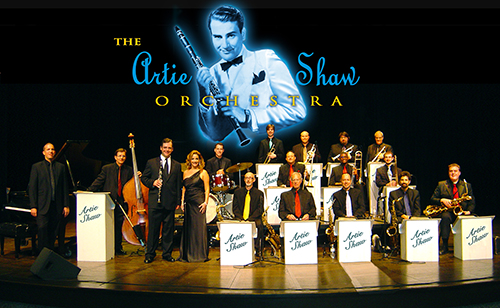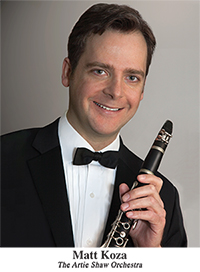Legendary Artie Shaw Orchestra to Play at JSU on March 1
02/14/2013

On the eve of America's entry into World War II, TIME magazine reported that to the German masses the United States meant "sky-scrapers, Clark Gable, and Artie Shaw." Some 42 years after that, in December l983, Artie Shaw made a brief return to the bandstand, after thirty years away from music, not to play his world-famous clarinet but to launch his latest (and still touring) orchestra at the newly refurbished Glen Island Casino in New Rochelle, New York.
On Friday evening, March 1, this new Artie Shaw Orchestra, described as "one of the swingingest outfits around," will play a free concert at Jacksonville State University's Leone Cole Auditorium at 7:30 p.m.
Under the direction of clarinetist Matt Koza, the group hews to the Shaw legacy, and continues with the time-tested formula that has always pleased a full spectrum of audiences from the “Begin the Beguine” fans of yesteryear to the new jazz fans who want to imbibe in an exciting and heady evening of Swing.
A Brief History of the Artie Shaw Big Band
Artie Shaw was born in New York City on May 23, 1910 and was in the top echelon of bandleader/soloists from the great swing era of 1935-45. He made his first public appearance as a leader in 1936, in a Swing Concert (history’s first) held at Broadway’s Imperial Theatre. Shaw could scarcely have known that within a short time he would make a hit record of a song called “Begin the Beguine,” which he once jokingly refers to as “a nice little tune from one of Cole Porter’s very few flop shows.”
Shortly before that he had hired Billie Holiday as his band vocalist (the first white bandleader to employ a black female singer as a full-time member of his band). The break-through hit record catapulted him into the ranks of top bandleaders and he was immediately dubbed the new “King of Swing.” Today, Shaw’s recording of “Begin the Beguine” sells thousands and has become one of the best-selling records in history.
The Baton is Passed
In 1954 Artie Shaw made his last public appearance as an instrumentalist when he put together a new Gramercy 5 made up of such superb modern musicians as pianist Hank Jones, guitarist Tal Farlow, bassist Tommy Potter, et al. He gave his blessing in the 1980s to an Artie Shaw Orchestra led by Dick Johnson, who led the orchestra for 25 years until his retirement in 2008. The baton has now been passed to clarinetist Matt Koza.
 Matt Koza
Matt Koza
Clarinetist /saxophonist Matt Koza is a native New Yorker, born in Manhattan and raised in Brooklyn. He studied saxophone at Binghamton University-State University of New York, where he received a Bachelor of Music degree in 1995. During the fall 1994 semester, Matt was awarded a Lemelson Fellowship to study music at Hampshire College, Amherst, MA. He attended graduate school at Youngstown State University in Ohio and Queens College-City University of New York, where he was awarded the 1999 ASCAP Foundation Louis Armstrong Scholarship.
In 2000 Matt began playing tenor saxophone with the Artie Shaw Orchestra, directed by Dick Johnson. During his tenure as the featured saxophone soloist with the orchestra they toured extensively worldwide, accompanying the likes of Tony Bennett, Jack Jones and Buddy DeFranco, and were featured at the Newport Jazz Festival. In 2004 the orchestra had the honor of performing at the dedication celebration of the National World War II Memorial in Washington, DC.
Matt is proud to assume the position as the director of the Artie Shaw Orchestra, and after years of being inspired by Dick Johnson's virtuoso clarinet performances, he is honored to be the next to carry on Artie Shaw's legacy.
Artie Shaw’s Career
Artie Shaw led several different bands throughout the 1930's, 40's and 50's, always trying new ideas. A musical innovator and always a perfectionist, he was a fantastic clarinetist, and his music remains some of the most interesting of the big band era.
1930-36: Artie started working in New York and became a top studio alto sax and clarinet player.
1936-37: He Jed his first band, an unusual Dixieland-style group with horns, guitar, bass, drwns, and a string quartet. Tony Pastor was on sax and vocals.
1938-39: He switched to a more traditional big band. Notable members included Georgie Auld, Buddy Rich, Tony Pastor, Jerry Gray, and singers Billie Holiday and Helen Forrest. He had his first smash hit recording, Begin the Beguine. Artie and the band were featured in the 1939 movie Dancing Coed.
1940: Shaw recorded and toured with a large band with a string section added. His hits from this hand were Stardust, Frenesi, Moonglow, and Dancing in the Dark. Notable players in this band, playing the solos on Stardust, were Billy Butterfield on trumpet and Jack Jenny on trombone. Artie and the band were featured in the 1940 movie Second Chorus with his Concerto for Clarinet. This band also featured a smaller combo, the Grammercy 5, consisting of clarinet, trumpet, harpsichord, bass, and drums.
1941: He eliminated the strings, going back to a standard big band, with 4 trumpets, 3 trombones, 5 saxes. guitar, piano, bass, and drums.
1942-43: Artie joined the Navy, and led a Navy band in the South Pacific, with some outstanding musicians, including the well -known trumpeter Conrad Gazzo.
1944-45: Out of the Navy, he had a dance band, featuring musicians such as Barney Kessel on guitar, Roy Eldridge on trumpet, and vocalist Mel Torme. This band recorded extensively, including his hit of S'Wonderful and many more.
1946-49 He played and recorded classical music. appearing in concert with several major symphonies.
1949: He started a jazz-oriented big band playing bebop, with 4 trumpets, 4 trombones, 5 saxes, and guitar, piano, bass, and drums. Al Cohn and Zoot Sims were featured in.this band.
1953-54: Artie formed the final version of his small group, the Grammercy 5, including Hank: Jones on piano and Tal Farlow on guitar, with vibes, bass, and drums. He then quit the music business completely in 1954.
1983: Artie asked Dick Johnson to lead a new Artie Shaw Orchestra.
2004: Artie Shaw passes away at the age of 94.

